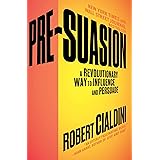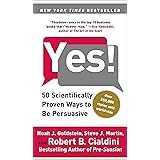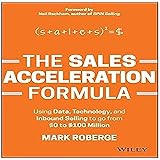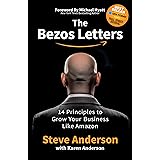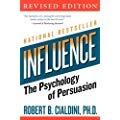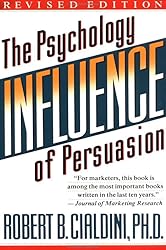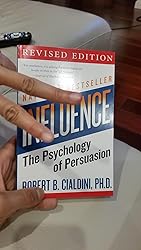Buy new:
$32.52$32.52
Save with Used - Good
$12.43$12.43
Ships from: Amazon Sold by: Alfar Deals

Download the free Kindle app and start reading Kindle books instantly on your smartphone, tablet, or computer - no Kindle device required.
Read instantly on your browser with Kindle for Web.
Using your mobile phone camera - scan the code below and download the Kindle app.

OK
Image Unavailable
Color:
-

-
-
- To view this video download Flash Player
-

-

-

-

-

-
 6 VIDEOS
6 VIDEOS -

Influence: The Psychology of Persuasion, Revised Edition Paperback – December 26, 2006
There is a newer edition of this item:
Purchase options and add-ons
The widely adopted, now classic book on influence and persuasion—a major national and international bestseller with more than four million copies sold!
In this highly acclaimed New York Times bestseller, Dr. Robert B. Cialdini—the seminal expert in the field of influence and persuasion—explains the psychology of why people say yes and how to apply these principles ethically in business and everyday situations.
You’ll learn the six universal principles of influence and how to use them to become a skilled persuader—and, just as importantly, how to defend yourself against dishonest influence attempts:
- Reciprocation: The internal pull to repay what another person has provided us.
- Commitment and Consistency: Once we make a choice or take a stand, we work to behave consistently with that commitment in order to justify our decisions.
- Social Proof: When we are unsure, we look to similar others to provide us with the correct actions to take. And the more, people undertaking that action, the more we consider that action correct.
- Liking: The propensity to agree with people we like and, just as important, the propensity for others to agree with us, if we like them.
- Authority: We are more likely to say “yes” to others who are authorities, who carry greater knowledge, experience or expertise.
- Scarcity: We want more of what is less available or dwindling in availability.
Understanding and applying the six principles ethically is cost-free and deceptively easy. Backed by Dr. Cialdini’s 35 years of evidence-based, peer-reviewed scientific research—as well as by a three-year field study on what moves people to change behavior—Influence is a comprehensive guide to using these principles effectively to amplify your ability to change the behavior of others.
- Print length336 pages
- LanguageEnglish
- PublisherHarper Business
- Publication dateDecember 26, 2006
- Dimensions5.31 x 0.84 x 8 inches
- ISBN-10006124189X
- ISBN-13978-0061241895
Frequently bought together

Similar items that may deliver to you quickly
Editorial Reviews
Review
“Robert Cialdini has done the impossible: he has improved a masterpiece. The new version of Influence is a marvelously rich and engaging account of the subtle power that people exert on each other.” — Daniel Kahneman, Nobel Prize laureate and author of Thinking, Fast and Slow and Noise
“If there is only one book you’ll ever read, if there is only one expert whose advice you’ll trust, it should be this book and this author, Robert Cialdini.” — Angela Duckworth, author of Grit and founder and CEO of Character Lab
“This is the most important book ever written about the science of persuasion, and it just keeps getting better. I can’t imagine a more fascinating, more practical read.” — Adam Grant, New York Times bestselling author of Think Again and Originals and host of the TED podcast WorkLife
"Anyone who wants their abilities in communication or negotiation to be at their highest level has to read Robert Cialdini's book Influence. Your knowledge base is simply incomplete without it." — Chris Voss, author of the Wall Street Journal bestseller Never Split the Difference
“Influence is now even more practical and powerful. The new principle of unity alone is a game changer. Bravo!” — BJ Fogg, Ph.D., founder of Stanford’s Behavior Design Lab
“The clouds have parted for everyone who wants to dent the universe. A new edition of what is already indispensable just got more so.” — Guy Kawasaki, chief evangelist of Canva and creator of the Remarkable People podcast
"In this update of his classic book, the world's most practical social psychologist shares his wisdom and reveals his charm. There's dynamite here. Please use what you learn with care!" — Richard Thaler, Nobel Prize laureate and author of Nudge and Misbehaving
“If you could read just one book on how to be more effective in business and life, I’d pick Influence. It’s a tour de force that Cialdini has somehow made more marvelous.” — Katy Milkman, professor at the Wharton School, host of the Choiceology podcast, and author of How to Change
“A phenomenal book! Whether you seek to boost sales, strike a better deal, or improve your relationships, Influence offers scienti?cally tested principles that can change your life.” — Daniel L. Shapiro, Ph.D., founder and director of the Harvard International Negotiation Program and author of Negotiating the Nonnegotiable
“Influence richly deserves its status as the de?nitive book on the subject. I learned so much from this revised edition, and so will you.” — Tim Harford, author of The Data Detective (US)/How to Make the World Add Up (UK)
“Prepare to be dazzled. Bob Cialdini is the godfather of in?uence, and the original version of this book is already a classic. Whether you’re trying to in?uence or understand how others in?uence you, this book will show you how.” — Jonah Berger, professor at the Wharton School and author of Contagious and The Catalyst
“A remarkable effort and achievement. Influence remains the brilliantly written treatise on fundamental principles of human behavior, with the addition of a timely new principle.” — Jeffrey Pfeffer, Thomas D. Dee II Professor of Organizational Behavior at the Stanford Graduate School of Business and author of Power: Why Some People Have It—and Others Don’t
“Influence is a modern business classic that has profoundly shaped the ?elds of marketing and psychology. Robert Cialdini’s new edition makes a brilliant book even better, with robust new insights and examples.” — Dorie Clark, author of Reinventing You and executive education faculty, Duke University Fuqua School of Business
“The new Influence is nothing short of a masterpiece. The writing is both timeless and worth reading immediately.” — Joe Polish, founder of Genius Network
“Influence is a must-read for anyone who wants to understand the decision-making process. It is simply essential reading in the canon of psychology and behavioral ?nance.” — Barry Ritholtz, chairman and chief investment of?cer of Ritholtz Wealth Management
“Cialdini has made a classic even better. This updated edition of Influence af?rms its place as one of the most important books on business and behavior of the last ?fty years. The new additions are terri?c.”
— Daniel H. Pink, author of When, Drive, and To Sell Is Human
"Influence is the only book I’ve assigned to my organizational behavior students at Stanford for the last twenty-?ve years. Students love it, and, years later, rave about how helpful it is has been throughout their careers. The new version is even more useful and nuanced— and even more fun to read." — Robert I. Sutton, professor at the Stanford Graduate School of Business and author of seven books, including New York Times bestsellers The No Asshole Rule and Good Boss, Bad Boss
“Like every psychologist I know (and like many thousands of others who are curious about how the world works), I got my start learning about persuasion with Bob Cialdini’s Influence. This revised edition builds so meaningfully on the worn ?rst edition sitting next to my desk—Influence will continue to clarify and inspire the art and science of persuasion for years to come.” — Betsy Levy Paluck, professor of psychology and public affairs, deputy director of the Kahneman-Treisman Center for Behavioral Science and Public Policy, Princeton University
"Robert Cialdini is a pioneer in translating complex scientific work into a fun and digestible form that the rest of us can understand and benefit from. In this updated version of Influence, Cialdini updates what was already a powerhouse book with the latest, cutting edge research and new narratives to masterfully draw the reader in. Influence was always a must read and, now, it is even more so." — Annie Duke, author of Thinking in Bets and How to Decide
From the Back Cover
Influence, the classic book on persuasion, explains the psychology of why people say "yes"—and how to apply these understandings. Dr. Robert Cialdini is the seminal expert in the rapidly expanding field of influence and persuasion. His thirty-five years of rigorous, evidence-based research along with a three-year program of study on what moves people to change behavior has resulted in this highly acclaimed book.
You'll learn the six universal principles, how to use them to become a skilled persuader—and how to defend yourself against them. Perfect for people in all walks of life, the principles of Influence will move you toward profound personal change and act as a driving force for your success.
About the Author
Robert B. Cialdini, PhD is an award-winning behavioral scientist and author. He is the president and CEO of Influence at Work, focusing on live and virtual keynotes, streaming and online corporate training.
In acknowledgement of his outstanding research achievements and contributions in behavioral science, Dr. Cialdini was elected to the American Academy of Arts & Sciences and the National Academy of Sciences. He has over 230 professional and scientific publications. Robert Cialdini is Regents' Professor Emeritus of Psychology and Marketing at Arizona State University.
Dr. Cialdini is known as the foundational expert in the science of influence and how to apply it ethically in business and elsewhere, and his Principles of Persuasion have become the cornerstone for any organization serious about increasing their effectiveness in sales, leadership, marketing, management and communication. He is a three-time New York Times bestselling author, with more than 5 million copies sold throughout the world. He is frequently referred to as the “Godfather of Influence.”
Excerpt. © Reprinted by permission. All rights reserved.
Influence
The Psychology of PersuasionBy Robert B. CialdiniHarperCollins Publishers
Copyright ©2007 Robert B. CialdiniAll right reserved.
ISBN: 9780061241895
Chapter One
One of the reasons reciprocation can be used so effectively as a device for gaining another's compliance is its power. The rule possesses awesome strength, often producing a "yes" response to a request that, except for an existing feeling of indebtedness, would have surely been refused. Some evidence of how the rule's force can overpower the influence of other factors that normally determine whether a request will be complied with can be seen in a second result of the Regan study, Besides his interest in the impact of the reciprocate rule on compliance Regan was also interested in how liking for person affects the tendency to comply with that person's request. To measure how liking toward how affected the subjects' decisions to buy his raffle tickets, Regan had them fill out several rating scales indicating how much they liked Joe. He then compared their liking responses with the number of tickets they had purchased from Joe. There was significant tendency for subjects to by more raffle tickets from Hoe the more they liked him. But this alone is hardly a startling finding. Most of us would have guessed that people are more willing to do a favor for someone they like.
The interesting thing about the Regan experiment, however, is that the relationship between liking and compliance was completely wiped out in the condition under which subjects had been given a Coke by Joe. For those who owed him a favor, it made no difference whether they liked him or not; they felt a sense of obligation to repay him, and they did. The subjects in that condition who indicated that they disliked Joe bought just as many of his tickets as did those who indicated that they liked him. The rule for reciprocity was so strong that it simply overwhelmed the influence of a factor—liking for the requester—that normally affects the decision to comply.
Continues...
Excerpted from Influenceby Robert B. Cialdini Copyright ©2007 by Robert B. Cialdini. Excerpted by permission.
All rights reserved. No part of this excerpt may be reproduced or reprinted without permission in writing from the publisher.
Excerpts are provided by Dial-A-Book Inc. solely for the personal use of visitors to this web site.
Product details
- Publisher : Harper Business; Revised edition (December 26, 2006)
- Language : English
- Paperback : 336 pages
- ISBN-10 : 006124189X
- ISBN-13 : 978-0061241895
- Item Weight : 9.8 ounces
- Dimensions : 5.31 x 0.84 x 8 inches
- Best Sellers Rank: #12,250 in Books (See Top 100 in Books)
- #13 in Marketing & Consumer Behavior
- #357 in Motivational Self-Help (Books)
- #361 in Success Self-Help
- Customer Reviews:
Videos
Videos for this product

2:11
Click to play video

Watch Before Buying - Use Influence For Good Deeds
✅ Paulo Recommends

About the author

Dr. Robert Cialdini, thought leader in the field of Influence, has spent his entire career conducting, testing, analyzing, and publishing peer-reviewed scientific research on what causes people to say “Yes” to requests. The results of his research, his ensuing articles, and his New York Times bestselling books have earned him an acclaimed reputation as a respected scientist and engaging storyteller.
Robert Cialdini’s books, including his New York Times Bestselling Influence and Pre-Suasion, have sold more than seven-million copies in 44 different languages.
Dr. Cialdini is known globally as the foundational expert in the science of influence and how to apply it ethically in business. His Principles of Persuasion have become a cornerstone for any organization serious about effectively increasing their influence. As a keynote speaker, Dr. Cialdini has earned a world-wide reputation for his ability to translate the science through valuable and memorable stories. These on-stage stories are both dramatic and indelible leading to long-term applications. Because of all of this, he is frequently regarded as “The Godfather of Influence”.
Dr Cialdini is Regents’ Professor Emeritus of Psychology and Marketing at Arizona State University. Dr. Cialdini received his PhD from University of North Carolina and post doctoral training from Columbia University. He holds honorary doctoral degrees (Doctor Honoris Causa) from Georgetown University, University of Social Sciences and Humanities in Wroclaw, Poland and University of Basil in Switzerland. He has held Visiting Scholar appointments at Ohio State University, the University of California, the Annenberg School of Communications, and the Graduate School of Business of Stanford University.
Dr. Cialdini is known globally as the foundational expert in the science of influence and how to apply it ethically in business. His Principles of Persuasion have become a cornerstone for any organization serious about effectively and ethically increasing their influence.
In acknowledgement of his outstanding research achievements and important contributions to world knowledge , Dr. Cialdini has been elected to the American Academy of Arts & Sciences and the National Academy of Sciences.
As a keynote speaker, Dr. Cialdini has earned a world-wide reputation for his ability to translate the science through valuable and memorable stories. These on-stage stories are both dramatic and indelible leading to long-term applications.
Because of all of this, Robert Cialdini is frequently regarded as “The Godfather of Influence”.
Customer reviews
Customer Reviews, including Product Star Ratings help customers to learn more about the product and decide whether it is the right product for them.
To calculate the overall star rating and percentage breakdown by star, we don’t use a simple average. Instead, our system considers things like how recent a review is and if the reviewer bought the item on Amazon. It also analyzed reviews to verify trustworthiness.
Learn more how customers reviews work on AmazonReviews with images
-
Top reviews
Top reviews from the United States
There was a problem filtering reviews right now. Please try again later.
Below are key excerpts from this book that I found particularly insightful:
1- "The impressive aspect of the rule for reciprocation and the sense of obligation that goes with it is its pervasiveness in human culture. It is so widespread that after intensive study, sociologists such as Alvin Gouldner can report that there is no human society that does not subscribe to the rule. And within each society it seems pervasive also; it permeates exchanges of every kind."
2- "The reciprocation rule brings about mutual concession in two ways. The first is obvious. It pressures the recipient of an already made concession to respond in kind. The second, while not so obvious, is pivotally important. Just as in the case of favors, gifts. or aid, the obligation to reciprocate a concession encourages the creation of socially desirable arrangements by ensuring that anyone seeking to start such an arrangement will not be exploited."
3- "Certainly, then, good personal consistency is highly valued in our culture. And well it should be. It provides us with a reasonable and gainful orientation to the world. Most of the time we will be better off if our approach to things is well laced with consistency. Without it our lives would be difficult, erratic, and disjointed. But because it is so typically in our best interests to be consistent, we easily fall into the habit of being automatically so, even in situations where it is not the sensible way to be. When it occurs unthinkingly, consistency can be disastrous."
4- "Once an active commitment is made, then, self-image is squeezed from both sides by consistency pressures. From the inside, there is a pressure to bring self-image into line with action. From the outside, there is a sneakier pressure--a tendency to adjust this image according to the way others perceive us."
5- "The tendency to see an action as more appropriate when others are doing it normally works quite well. As a rule, we will make fewer mistakes by acting in accord with social evidence than contrary to it. Usually, when a lot of people are doing something, it is the right tiling to do. This feature of the principle of social proof is simultaneously its major strength and its major weakness. Like the other weapons of influence, it provides a convenient shortcut for determining how to behave but, at the same time, makes one who use the shortcut vulnerable to the attacks of profiteers who lie in wait along its path."
6- "These results suggest an important qualification of the principle of social proof. We will use the actions of others to decide on proper behavior for ourselves, especially when we view those others as similar to ourselves."
7- "Few people would be surprised to learn that, as a rule, we most prefer to say yes to the requests of someone we know and like. What might be startling to note, however, is that this simple rule is used in hundreds of ways by total strangers to get us to comply with their requests."
8- "Compliance professionals are forever attempting to establish that we and they are working for the same goals, that we must "pull together" for mutual benefit, that they are, in essence, our teammates."
9- "This paradox is, of course, the same one that attends all I major weapons of influence. In this instance, once we realize that obedience to authority is mostly rewarding, it is easy to allow ourselves the convenience of automatic obedience. The simultaneous blessing and bane of such blind obedience is its mechanical character. We don't have to think; therefore, we don't. Although such mindless obedience leads us to appropriate action in the great majority of cases, there will be conspicuous exceptions--because we are reacting rather than thinking."
10- "The evidence, then, is clear. Compliance practitioners' reliance on scarcity as a weapon of influence is frequent, wide-ranging, systematic, and diverse...The first is familiar. Like the other weapons of influence, the scarcity principle trades on our weakness for shortcuts. The weakness is, as before, an enlightened one. In this case, because we know that the things that are difficult to possess are typically better than those that are easy to possess, we can often use an item's availability to help us quickly and correctly decide on its quality. Thus, one reason for the potency of the scarcity principle is that, by following it, we are usually and efficiently right.In addition, there is a unique, secondary source of power within the scarcity principle: As opportunities become less available, we lose freedoms; and we hate to lose the freedoms we already have."
11- "Very often in making a decision about someone or something, we don't use all the relevant available information; we use, instead, only a single, highly representative piece of the total. And an isolated piece of information, even though it normally counsels us correctly, can lead us to clearly stupid mistakes--mistakes that, when exploited by clever others, leave us looking silly or worse."
12- "We are likely to use these lone cues when we don't have the inclination, time, energy, or cognitive resources to undertake a complete analysis of the situation. Where we are rushed, stressed. uncertain, indifferent, distracted, or fatigued, we tend to focus on less of the information available to us. When making decisions under these circumstances, we often revert to the rather primitive but necessary single-piece-of-good-evidence approach. All this leads to a jarring insight: With the sophisticated mental apparatus we have used to build world eminence as a species, we have created an environment so complex, fast-paced, and information-laden that we must increasingly deal with it in the fashion of the animals we g ago transcended."
Robert Cialdini nails it with Influence: The Psychology of Persuasion. It is such a useful book in daily life: whether you are a normal consumer who is trying to avoid the guilt of sales pitches or a business owner, who is trying to utilize the teachings to take your product to the next level. We are all being manipulated by psychology at every moment, whether we like it or not. I have recently discovered that all of my favorite entrepreneurs, such as Mark Zuckerberg, had majored (or minored) in Psychology in school. Psychology is something that makes us stronger and more complete people for understanding.
I will go through some sections of the book that I found particularly helpful:
-Salespeople who offer a gift before they give you their pitch have subconsciously commanded a returned gift from you because of the theory of reciprocity: gift given is extremely powerful and it always makes the other person feel obligated to give back, even if it is in a different form like signing a petition or buying a product that is presented. As a consumer, you don't want to feel bad for objecting the gift because know you know the power and tactic that they are trying to use on you and you understand that there are no feelings hurt. I turn down these types of offers with a smile on my face now because I'm no sucker.
-Social proof: we are all taking other people's advice without even know it. If you see a homeless person on the street who may have fainted, yet everyone around is walking and going about their day normally, you will think that the person laying on the street is fine. Obviously, someone would have called the cops or an ambulance if there were something wrong. This is the fallacy: because nobody has called since everyone thinks that everyone else already has called. This is a good tactic to know to report these types of problems, like someone screaming for help, for instance. It is also good if you are a victim, so that you can call out to a specific person and point to them and ask them to call a doctor or a police officer, etc. This will better your chances of survival if you are in a dire situation where there are many observers but nobody knows what to do. Also, we purchase items because other people have purchased them. If there is only one can of soup on the shelf at the store it must be good, since others have been buying it as opposed to the other brands. The same goes for tipping at a bar or restaurant's tip jar: more people will feel the need to tip if they are not the only one doing it. I have heard that even some bars put their own starter money in the jar to alleviate the feeling of the tipper being an outsider and will cause more people to tip.
-Attractive people are more likable and agreeable. They are even more likable, still, if they dress in the same style as yourself and match your tone of voice and body language. This is important to know because people will work with you more if they see a little of themselves in your, or if you are so attractable that it is welcoming to them.
-Scarcity is powerful in controlling something's desirability: we often feel more want for something just because of its limited availability and if it is selling out quickly. We feel that we won't have a chance to have it again: which is wrong, yet we let ourselves think this way anyway. Salespeople are notorious for making products seem less available than they really are, just to elicit the sense of urgency when buying. Many times, after a product is bought, the consumer doesn't even remember what made them want it so much in the first place. It is usually scarcity that is a big factor.
Whichever side of the spectrum you are on: provider or consumer, you will find yourself in situations that are made easier with the knowledge that is in this book. It is like knowing how to play chess instead of just letting others take advantage of you on the playing board. If you want to win in life, you will need to know your fair share of psychology. I would argue that this book is a few Psychology courses wrapped into one: because a psychology course will probably reference material from this book anyway and not make it as interesting or understandable. I gave this book to my girlfriend so that she wouldn't get taken advantage of (because women are often an easier target for salespeople). I have also referenced it more than once and wouldn't mind reading it over again. The theories definitely stick and it is one of the books you will remember most in your life.
-Ken Flemming
Author, How to Get a Job in Video Games
Top reviews from other countries
Esta basado en estudios y no solo en experiencias personales, definitivamente te da otra visión de cómo acercarse al público objetivo con estrategias ideales y específicas para influir en ellos.
A must have!
Robert Cialdini is spot on with his persuasive book on psychology and gives us brilliant examples and anecdotes on how 'Influence' works on us in the most subtle yet powerful ways possible.
The 6 'Weapons of Influence' as he calls them are Reciprocation, Commitment and Consent, Social Proof, Liking, Authority and Scarcity. Everyday we use one of these tools to soften, convince and sell to others. Conversely, these tools are used on us by others and we fall into traps of bargaining, buying and possessing.
The 'How Not To' at the end of each chapter reveals so much about consumer psychology.
Must read if you are Selling anything...





